Clover POS is a popular hardware and software bundle suitable for various small businesses—including retailers, restaurants, and service businesses. The Clover point-of-sale system is adaptable, easy to use, and highly versatile, earning a respectable 4.08 out of 5 in our evaluation of the best POS systems. The system also earned a 4.3 out of 5 across third-party review sites. It was docked points for inconsistency in pricing and limitations in Clover’s management features.
Clover is owned by Fiserv (formerly First Data) but allows third-party resellers to program other payment services into the system. This makes Clover unique because businesses that already have a merchant account they like or that want to shop around for the lowest processing rates can purchase Clover POS from their preferred merchant account.
Overview

Pros
- Can be programmed to integrate with other payment processing services
- Affordable plans with access to proprietary hardware
- Plans and hardware can be paid upfront or via monthly installments
- Can process card payments while offline
Cons
- No built-in vendor management tools
- Hardware tied to the merchant account (Cannot be reprogrammed)
- Little oversight of third-party resellers means contracts vary in quality
- Must use Clover hardware
Deciding Factors
Supported Business Types | Retail stores, full-service and quick-service restaurants, personal and professional services |
Standout Features |
|
Monthly Software Fees | Average $60–$185 per month (retail) $100–$190 per month (quick-service restaurants) $160–$310 per month (full-service restaurants) |
Setup and Installation Fees | DIY installation; personalized setup also available for a fee |
Contract Length | Month-to-month |
Payment Processing Options | Comes with Fiserv payment processing by default but resellers can reprogram the system to support other merchant service providers |
Payment Processing Fees | Varies (depending on merchant service provider) Fiserv:
|
Customer Support |
|
Is Clover Right for You?
Who Should Use Clover
- Businesses wanting an alternative to Square
- Businesses that prefer or frequently use a mobile POS system or need a good standalone mobile payment app
- Sellers who want flexibility with merchant service providers
Clover leads our top recommendations for Square alternatives, providing a low-cost, fully integrated solution. It is ideal for businesses that rely heavily on sales mobility—those needing to complete transactions across sales floors, events, or curbside. Clover Go is our recommended mobile payment app for age-restricted products and existing Clover users.
Additionally, Square restricts you to using Square Payments to process transactions, so users looking for flexibility will appreciate the ability to use an existing merchant account with Clover.
Who Should Use an Alternative
- Businesses with no preferred merchant account
- Businesses with fast-moving stock or that need top-level inventory management
- Businesses that do not want to use proprietary hardware
Clover POS Alternatives
Best for | Monthly fee from | Hardware cost from | Full review | |
|---|---|---|---|---|
Choosing your own merchant service provider | $14.95 | $49 | ||
Businesses with large-volume or fast-moving inventory | $89 (Annual pricing $69) | $329 (iPad) | ||
Businesses needing mobile and in-store POS | $0 | $59 (Square card reader) | ||
Restaurants | $0 | $0 (Pay-as-you-go pricing available | ||
Small hybrid restaurants | $0 plus $9–$25 add-ons | Varies | ||
If you’re not sure which POS is right for you, check out our reviews of the top Clover alternatives.
Clover POS Reviews From Users
It’s surprising to see that given how widely distributed Clover is (through over 3,000 partners), there are still not a lot of user reviews. Most of the new feedback is positive but since the number of reviews is low, a couple of poor scores easily affected the results.
Overall Clover POS User Ratings:
- Capterra1: 3.9 out of 5 stars from more than 440 reviews
- G22: 3.8 out of 5 stars from around 80 reviews
Meanwhile there are a lot of new Clover app reviews from Apple users, raising the score to 4.9 out of 5 from over 46,000 reviews. Android users rated it 4.7 out of 5, based on well over 4,000 reviews. Finances Online’s Customer Satisfaction Algorithm, which gathers reviews, comments, and opinions from users, still maintains a 99% user satisfaction rating for Clover POS.
These are some of the trends we noticed when reading through Clover’s reviews:
| Users Like | Users Don’t Like |
|---|---|
| Proprietary hardware (particularly the portable hardware) | Payroll and vendor management functions require third-party apps that drive up monthly fees |
| Hardware is simple to set up and easy to configure | Poor customer service for setup and billing issues |
| Easy-to-use once it’s set up | Lacks inventory photos |
| Reports are easy to generate and use | Hardware is expensive |
Clover’s pricing scheme is complex and lacks clarity compared to other POS providers; this caused it to lose some points in our evaluation. While the Starter subscription plan is quite attractive, missing features that require add-on costs and flat-rate transaction fees can quickly eat away at your revenue. Also, note that Clover has little control over how resellers price and set terms of use, so these many options can be overwhelming for those who are not familiar with Clover.
Clover’s subscription plans will depend both on your business type, and the proprietary hardware you choose to get. Within each subscription plan are software plans with functionalities varying based on the hardware. Thus, the price of your system will be a combination of these factors, which can easily get confusing.
Prices for Retail & Professional Services Businesses
Subscription Plan | Starter | Standard | Advanced |
|---|---|---|---|
Fee | Retail: $799 + $14.95 per month, or $60 per month for 36 months Professional Services: $14.95 per month | Retail: $1,799 + $49.95 per month, or $135 per month for 36 months Professional Services: $599 + $14.95 per month, or $50 per month for 36 months | Retail: $2,398 + $64.90 per month, or $185 per month for 36 months Professional Services: $1,699 + $49.95 per month, or $125 per month for 36 months |
Included Software Plan | Essentials | Retail: Register Professional Services: Essentials | Register |
Card-present Processing Rate | Retail: 2.6% + 10 cents Not available for professional services | Retail: 2.3% + 10 cents Professional Services: 2.6% + 10 cents | Retail: 2.3% + 10 cents Professional Services: 2.3% + 10 cents |
Keyed-in Processing Rate | 3.5% + 10 cents | 3.5% + 10 cents | 3.5% + 10 cents |
Included Hardware | Retail: Clover Mini Professional Services: None | Retail: Station Duo Professional Services: Clover Flex | Retail: Station Duo, Clover Flex Professional Services: Station Solo |
Prices for Restaurants
Subscription Plan | Starter | Standard | Advanced |
|---|---|---|---|
Fee | Quick-service dining: $799 + $54.95 per month, or $100 per month for 36 months Full-service dining: $1,699 + $84.95 per month, or $160 per month for 36 months | Quick-service dining: $1,799 + $54.95 per month, or $140 per month for 36 months Full-service dining: $2,298 + $99.90 per month, or $210 per month for 36 months | Quick-service dining: $2,398 + $69.90 per month, or $190 per month for 36 months Full-service dining: $4,097 + $114.85 per month, or $310 per month for 36 months |
Included Software Plan | Quick-service dining: Counter Service Restaurant Full-service dining: Table Service Restaurant | Quick-service dining: Counter Service Restaurant Full-service dining: Table Service Restaurant | Quick-service dining: Counter Service Restaurant Full-service dining: Table Service Restaurant |
Card-present Processing Rate | 2.3% + 10 cents | 2.3% + 10 cents | 2.3% + 10 cents |
Keyed-in Processing Rate | 3.5% + 10 cents | 3.5% + 10 cents | 3.5% + 10 cents |
Included Hardware | Quick-service dining: Clover Mini Full-service dining: Station Solo | Quick-service dining: Station Duo Full-service dining: Station Solo, Clover Flex | Quick-service dining: Station Duo, Clover Flex Full-service dining: Station Solo, Clover Flex, Station Duo |
Notice that the monthly subscription plan determines the software plan and payment processing rates. Choose a monthly subscription and note the available hardware for each.
Clover Hardware
Search below for the available hardware in your chosen subscription plan. This will inform you of the software features included in each plan for the particular device.
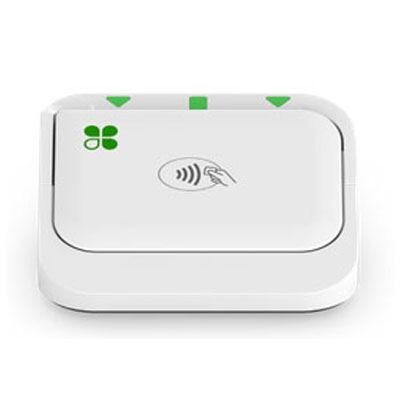
Pair the Clover Go credit card reader with your smartphone app to get a mobile POS system. (Source: Clover)
Price:
- Payments: $49
- Essentials: $49 + $14.95 per month
Features:
- Chip, dip, or tap payments, including Apple Pay, Samsung Pay, and Google Pay
- Connects to Wi-Fi and cellular networks but takes offline payments as well
- Syncs with Clover web dashboard
- Encryption and tokenization
- View open, pending, and completed transactions
Payments | Essentials | |
|---|---|---|
Order management | ✕ | ✓ |
Online store builder | Optional add-on | Optional add-on |
Sales reports | ✓ | ✕ |
Tax reports | ✕ | ✓ |
Employee management | ✓ | ✓ |
Payroll integrations | Optional add-on | Optional add-on |
Promos, loyalty, and gift cards | ✕ | ✓ |
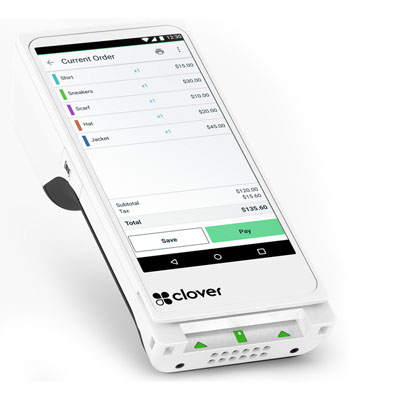
The Clover Flex is a portable POS device with built-in printer, camera, and barcode scanner. (Source: Clover)
Price:
- Payments: $599 or $35/mo for 36 months
- Essentials: $599 + $14.95/mo or $50/mo for 36 months
- Register: $599 + $49.95/mo or $85/mo for 36 months
Features:
- Accept most payments, including touchless payments like Apple Pay, Google Pay, WeChat Pay, or Alipay
- Built-in receipt printer
- Built-in camera/barcode scanner
- Fingerprint login for up to 50 unique fingerprints
- Fully mobile
- Full-fledged POS, terminal, and business management: Use as a stand-alone or with other Clover systems
- Wi-Fi and LTE connectivity
- Lithium battery
Payments | Essentials | Register | |
|---|---|---|---|
Order management | ✕ | ✓ | ✓ |
Online store builder | Optional add-on | Optional add-on | Optional add-on |
Sales reports | ✓ | ✕ | ✕ |
Tax reports | ✕ | ✓ | ✓ |
Employee management | ✓ | ✓ | ✓ |
Payroll integrations | Optional add-on | Optional add-on | Optional add-on |
Promos, loyalty, and gift cards | ✕ | ✓ | ✓ |
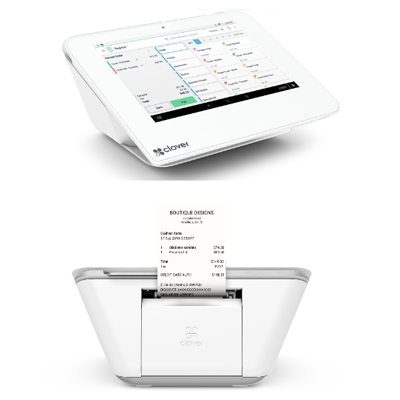
The Clover Mini is a larger POS system than the Flex, but still compact enough to fit into any tight space.
Price:
- Retail and services: $799 or $45/mo for 36 months
- Restaurants and food service: $799 or $100/mo for 36 months
Features for retail and services businesses:
Payments | Essentials | Register | |
|---|---|---|---|
Order management | ✕ | Some features | ✓ |
Online store builder | Optional add-on | Optional add-on | Optional add-on |
Sales reports | ✓ | ✕ | ✕ |
Tax reports | ✕ | ✓ | ✓ |
Employee management | ✓ | ✓ | ✓ |
Payroll integrations | Optional add-on | Optional add-on | Optional add-on |
Promos, loyalty, and gift cards | ✕ | ✓ | ✓ |
Features for restaurants:
Payments | Essentials | Register | |
|---|---|---|---|
Order management | ✓ | ✓ | ✓ |
No-fee online ordering | ✕ | ✓ | ✓ |
Integration with Grubhub and Order with Google | ✕ | ✓ | ✓ |
Menu variations and customization | ✕ | ✓ | ✓ |
Sales reports | ✓ | ✓ | ✓ |
Tax reports | ✓ | ✓ | ✓ |
Item costing | ✕ | ✓ | ✓ |
Employee management | ✓ | ✓ | ✓ |
Payroll integrations | Optional add-on | Optional add-on | Optional add-on |
Promos, loyalty, and gift cards | ✓ | ✓ | ✓ |
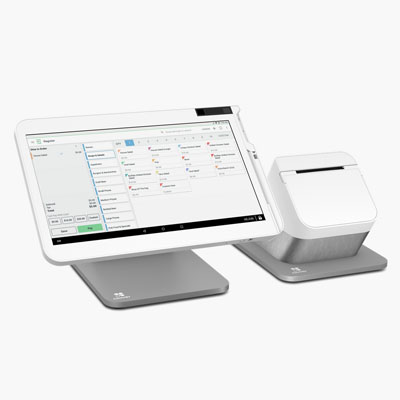
The Station Solo is a complete POS system with lots of processing power and features. (Source: Clover)
Price:
- Register: $1,699 + $49.95/mo, or $125/mo for 36 months
- Table service: $1,699 + $84.95/mo, or $160/mo for 36 months
Features:
- 14” touch screen, swivel display to accept signatures
- Pre-loaded with Clover software of your choice
- Built-in barcode scanner
- Four USB 2.0 ports and two cash drawer ports
- Fingerprint login
- Includes a stand-alone receipt printer with 4.3″ customer-facing visual display
- Integrates with barcode scanners, scales, kitchen printers, and other accessories
- Accepts traditional and contactless (NFC) payments
- RegisterTable serviceOrder management✓✓No-fee online ordering✕✓Integration with Grubhub and Order with Google✕✓Sales reports✓✓Tax reports✓Item costing✓✓Employee management✓✓Payroll integrationsOptional add-onOptional add-onPromos, loyalty, and gift cards✓✓
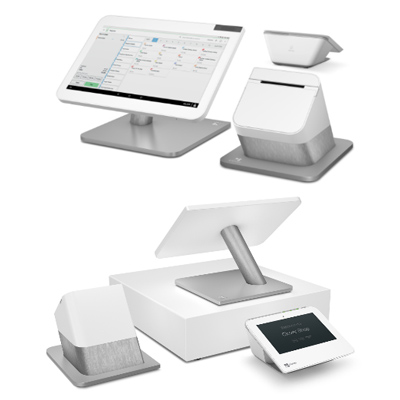
The Station Duo is an all-in-one, dual-screen POS solution with optional add-on devices and accessories available.
Price:
- Register: $1,799 + $49.95/mo, or $135/mo for 36 months
- Counter service: $1,799 + $54.95/mo, or $140/mo for 36 months
Features:
- 14” HD touch screen, swivel display
- 7” customer-facing touch screen
- Dual 5MP cameras with Zebra scanning software
- Pre-loaded with Clover software of your choice
- Built-in barcode scanner
- Four USB 2.0 ports and two cash drawer ports
- Fingerprint login
- Includes touch screen with a swipe, high-speed receipt printer, and cash drawer
- Integrates with barcode scanners, scales, kitchen printers, and other accessories
Register | Counter service | |
|---|---|---|
Order management | ✓ | ✓ |
No-fee online ordering | ✕ | ✓ |
Integration with Grubhub and Order with Google | ✕ | ✓ |
Sales reports | ✓ | ✓ |
Tax reports | ✓ | ✓ |
Item costing | ✓ | ✓ |
Employee management | ✓ | ✓ |
Payroll integrations | Optional add-on | Optional add-on |
Promos, loyalty, and gift cards | ✓ | ✓ |
You can purchase Clover hardware from Fiserv, Amazon, or any of over 3,000 resellers—that may give you a better price. Some may even lease the hardware, though we do not recommend this.
However, beware! Clover does not dictate leasing terms or prices for third-party vendors, so check reviews to make sure you are dealing with an ethical vendor. Most Clover complaints concern merchant account fees or termination fees, for example.
Further, you are tied to whatever merchant account you purchased the hardware from. Clover cannot be reprogrammed if you change your merchant account. So, for example, if you purchased your Clover system from Dharma Merchant Services, it will work only with Dharma.
Clover Payment Processing
Fiserv, one of the largest merchant services companies in the world, owns Clover. However, it allows other merchant services to resell the POS system. It lists more than 60 approved resellers on its website, but you can find Clover systems elsewhere, even on Amazon. They all use Fiserv as their backend payment processor but can impose their own terms and pricing.
This means you may be able to find more equitable payment processing rates and cheaper hardware—or you may find yourself in a bad deal. Fiserv has a list of trusted resellers but does not monitor them all. Do your research to find the most reputable merchant service.
Fiserv does not have a very favorable reputation when it comes to providing merchant services to small businesses (learn more about that in our Fiserv review).
If you are considering the Clover POS system and do not already have a compatible merchant account, we recommend that you look into the following resellers:
- Payment Depot One of our top recommendations for the cheapest merchant services for small businesses
- Dharma Merchant Services: Best for restaurants and small storefronts
- National Processing: Affordable and reliable option for small businesses, particularly when accepting ACH and e-check payments online.
Each of the processors above offers competitive rates, transparent pricing, and decent customer service.
Regardless of the processor, the software remains the same. As long as your reseller can process the payments, you can accept credit, debit, gift cards, and contactless payments like Apple Pay
That said, Clover’s default payment processing fees (with Fiserv) are listed as follows:
- For Retail and Services: 2.3% + 10 cents to 2.6% + 10 cents per card-present transaction, and 3.5% + 10 cents per card-not-present transaction
- For Restaurants: 2.3% + 10 cents per card-present transaction and 3.5% + 10 cents per card-not-present transaction
Virtual Terminal
If you prefer not to use Clover hardware, you can sign up for a Clover merchant account and use the virtual terminal to start accepting payments over the phone, in person, or with an invoice. It comes with end-to-end encryption to meet PCI compliance and is preloaded with your Clover dashboard.
Clover Virtual Terminal monthly fee: Free 90-day trial, and then $14.95/month; 3.5% + 10 cents keyed-in rate (Fiserv)
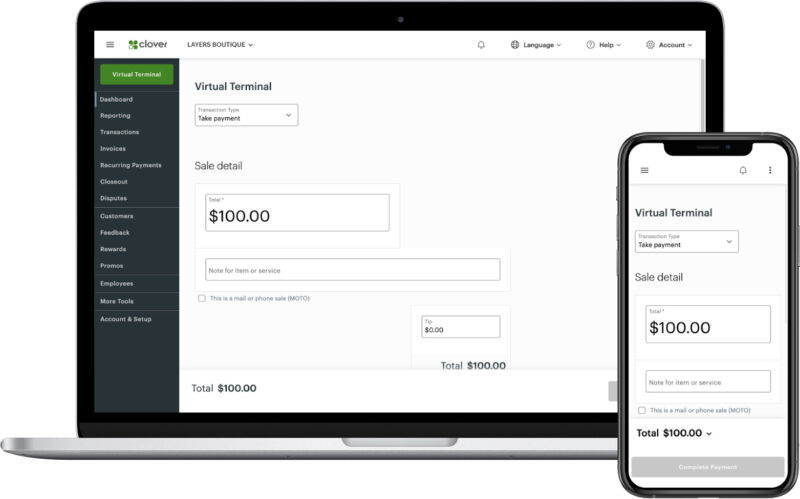
Clover’s virtual terminal is accessible from any browser on your mobile device or desktop. (Source: Clover)
Overall, Clover is an intuitive, versatile, and feature-rich system, offering several configurations and add-ons to quickly streamline your checkout process and improve customer experience. It allows you to ring up sales, run taxes automatically, input (or suggest) gratuities, program discounts by the hour or time of day (e.g., Happy Hour), and apply service or delivery charges automatically.
Many of these features are available with the basic paid plan ($799 + $14.95), but note that some features, like the website builder function, are paid add-ons. These add-on costs prevented Clover from scoring higher.
Other POS systems, like Square, offer these features with their free plan.
Here are a few things you can do with a Clover register:
- Accept swipe, dip, or tap payments using credit and debit cards, as well as contactless payments like Apple Pay, Google Pay, PayPal, and Venmo
- Process expanded payment methods such as scan-to-pay, store credits, layaways, gift cards, and Buy-Now-Pay-Later options
- Add mobility with Clover Flex handheld device, and Clover Go mobile card reader
- Print or email receipts—or with Scan and Pay, add a QR code to allow customers to pay with their phones. You can include feedback coupons as well.
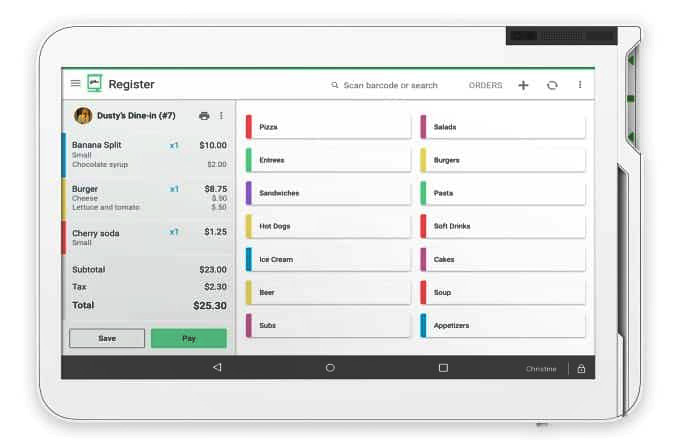
Clover lets you customize your screen with hotkeys and shortcuts. The search bar lets you find products by menu, bar code, or text. (Source: Clover)
Clover’s customer management tools let you set up customer profiles automatically from credit card sales. It enables you to garner sales histories, names, and birthdays and to save photos so that your employees can recognize and greet customers by name. Also, tracking contact and marketing preferences is easy.
The free Clover mobile app (available for iOS and Android) lets you create a data-driven rewards and loyalty program and promote it to customers. Send promotions via email, text, or social media. Develop segmented lists to focus on customer preferences, track customers who have not been back in a while, and tempt them in with a special deal. Finally, request customer feedback on receipts and set up a coupon reward. There’s also a reply function for following through on customer feedback.
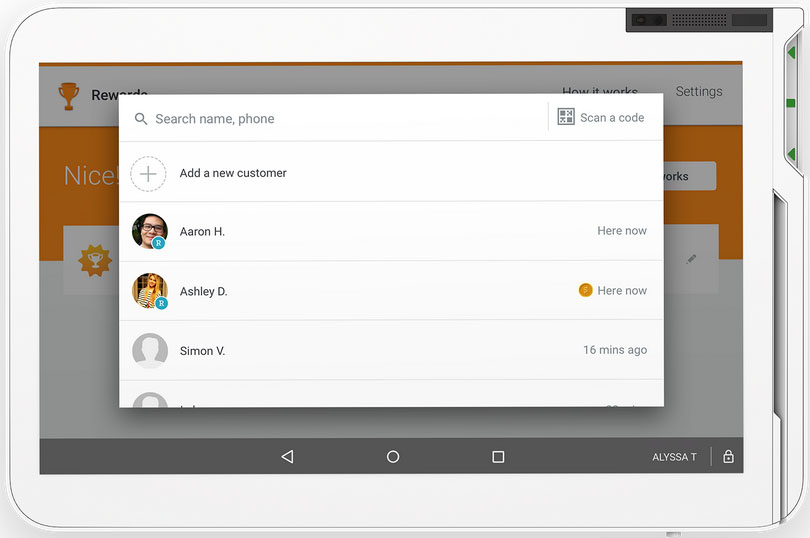
Clover allows you to create a detailed profile for customers right at the checkout counter. You’ll also have additional tools such as targeted promos and birthday rewards with Clover’s Customer Engagement Plus add-on ($99 per month). (Source: Clover)
With online ordering, you can design an online menu and let customers order, pay for their purchase, and arrange for a delivery or pick-up. You can also set it up so that even your dine-in customers can order and pay through their mobile devices. Clover’s omnichannel feature ensures that you get alerted to your online orders directly on your Clover terminal and that inventory is always updated for both your online and in-person orders.
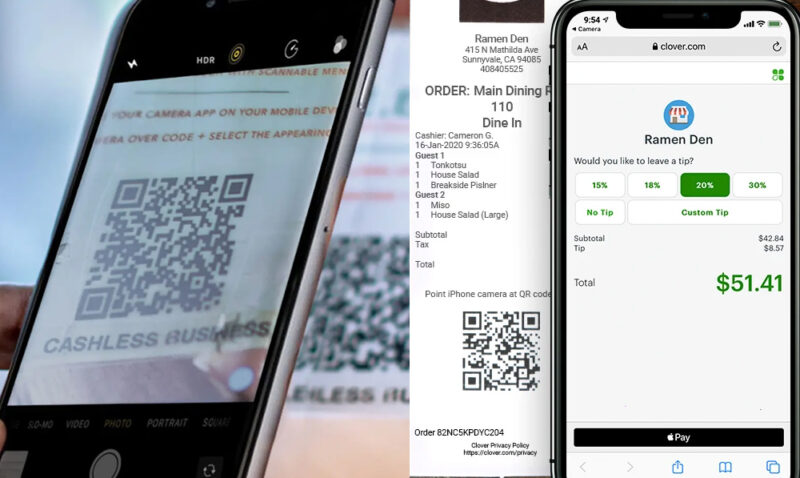
Give your customers a fully contactless dine-in experience with scan-to-order and scan-to-pay features. (Source: Clover)
Clover can easily integrate with your existing website, or Clover can help you create one through its partner ecommerce platform, BigCommerce. Clover’s inventory tracking occurs in real time as transactions happen both in-store and online, letting you manage everything from a single platform.
You can also find other ecommerce platforms such as WooCommerce, Shopify, and appointment scheduler apps for service-based businesses. Developer tools are also available for those who want a highly customized website.
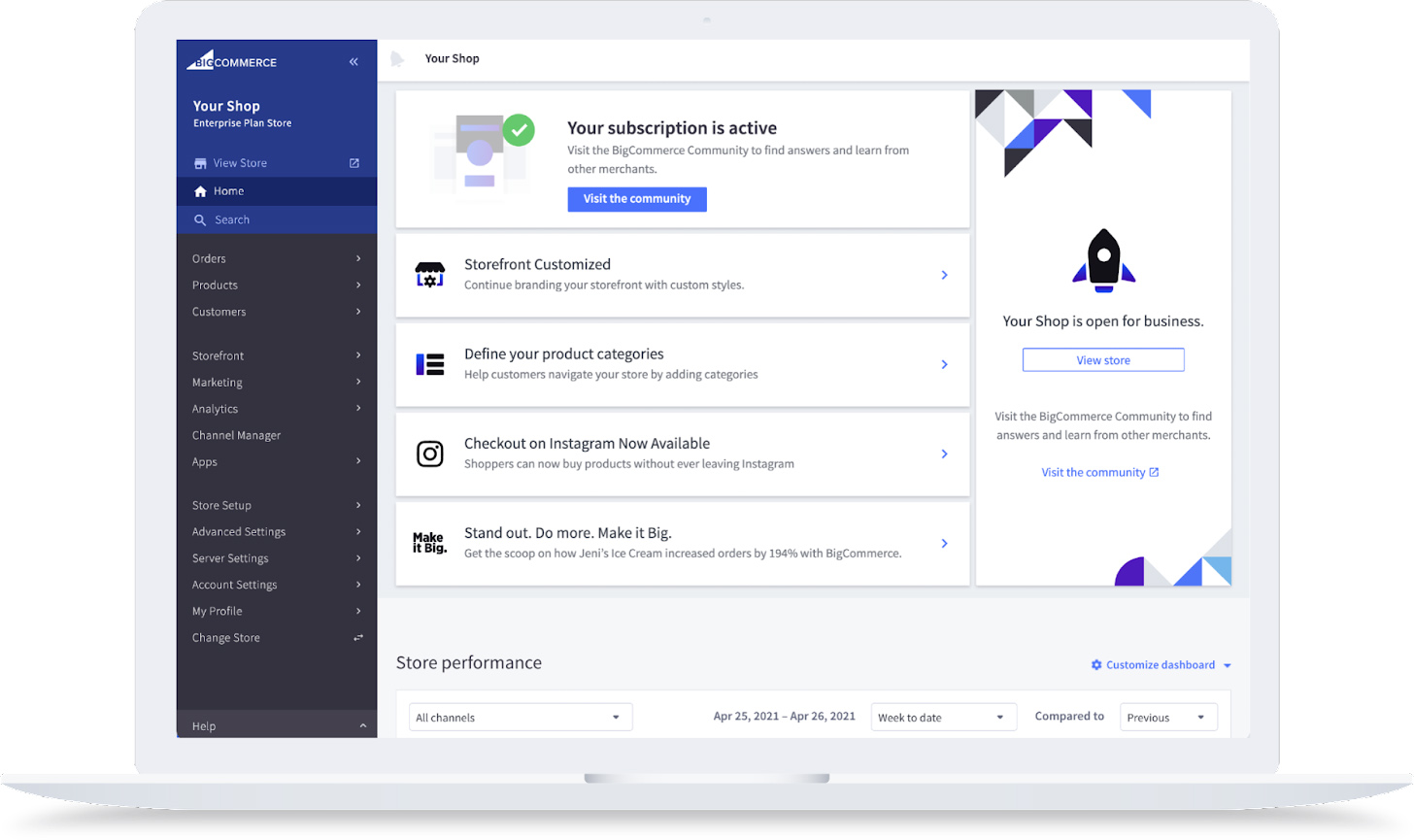
BigCommerce is Clover’s primary partner for creating websites. (Source: Clover)
While not the best in class, Clover’s business management tools are robust enough to handle fast-growing businesses, particularly restaurants. You can track ingredients and their costs, items, and variants, manage employee access and shift schedules, create and track invoices, and generate detailed sales and tax reports.
However, Clover does not have built-in vendor management tools. Also, most of the advanced features are gated in its higher subscription plans. And, while these are still within reasonable price ranges ($799–$4,097 + $14.95–$114.85 per month for hardware and software), adding more third-party integration fees can quickly increase your monthly cost.
The Clover inventory system includes bulk editing, stock tracking, enhanced filtering, multi-location stock transfers, and itemized order creation for special work orders. It also automatically adjusts stock levels when processing returns and exchanges. For restaurants, Clover supports color-coded categories, marking “sold out” by item, and item modifiers and labels.
However, one black mark on Clover is that it does not hold images for items like so many POS software. This is a much-requested feature by Clover customers.
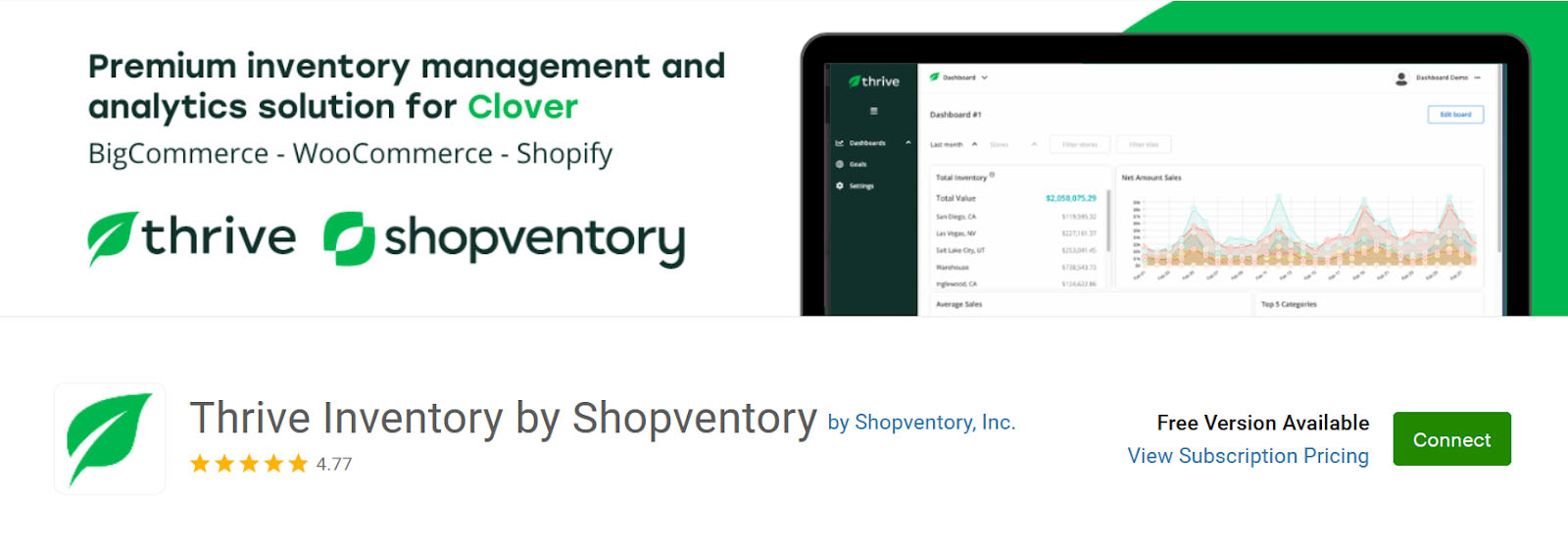
Clover offers third-party integrations with a number of inventory management apps such as Thrive’s Shopventory ($49 per month after a 30-day free trial). (Source: Clover)
Clover now has an invoice management function that comes with the virtual terminal. This feature lets you create simple, professional-looking invoices with “pay now” buttons for frictionless payment via credit or debit card. You can use your Clover web dashboard or any smart device to send these invoices via email and track the status until it gets paid. You can also automate sending of recurring payments, client notifications, and payment receipts. Clover keeps track of all invoices that have been sent or paid, or that are pending.
If you prefer to use third-party apps for invoicing, Clover integrates with several options such as InvoiceAble and Invoiss.
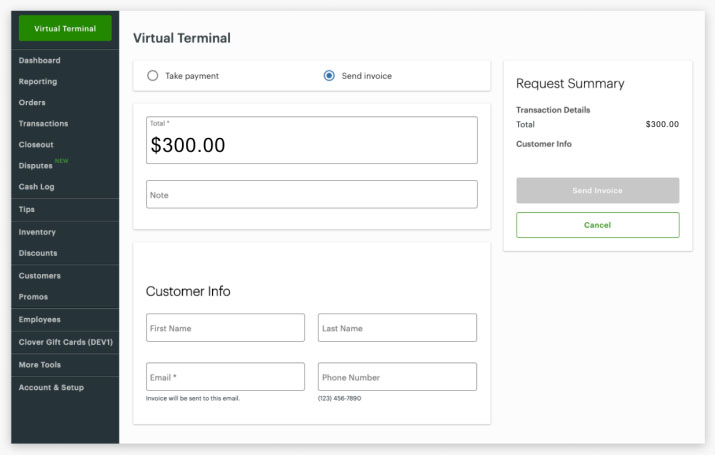
Encourage clients to settle their bills faster by sending invoices online. (Source: Clover)
Clover allows you to have unlimited employees on a single console and set permissions to limit access to what each worker needs for their job. It also links with apps—some free and some for an extra charge—to help you manage employees.
Clover’s software also allows you to incentivize employees by setting up customizable tip screens, letting customers select a percentage tip to give your staff.
Clover offers the free app Time Clock by Homebase. With a paid Homebase account (which starts at $24.95 per month), you can manage performance, get health and safety screening, job costing, and even dedicated HR advisers. Homebase is one of our recommended free employee scheduling apps. Other apps are also available for functions such as tip pooling, managing payroll, and calculating commissions.
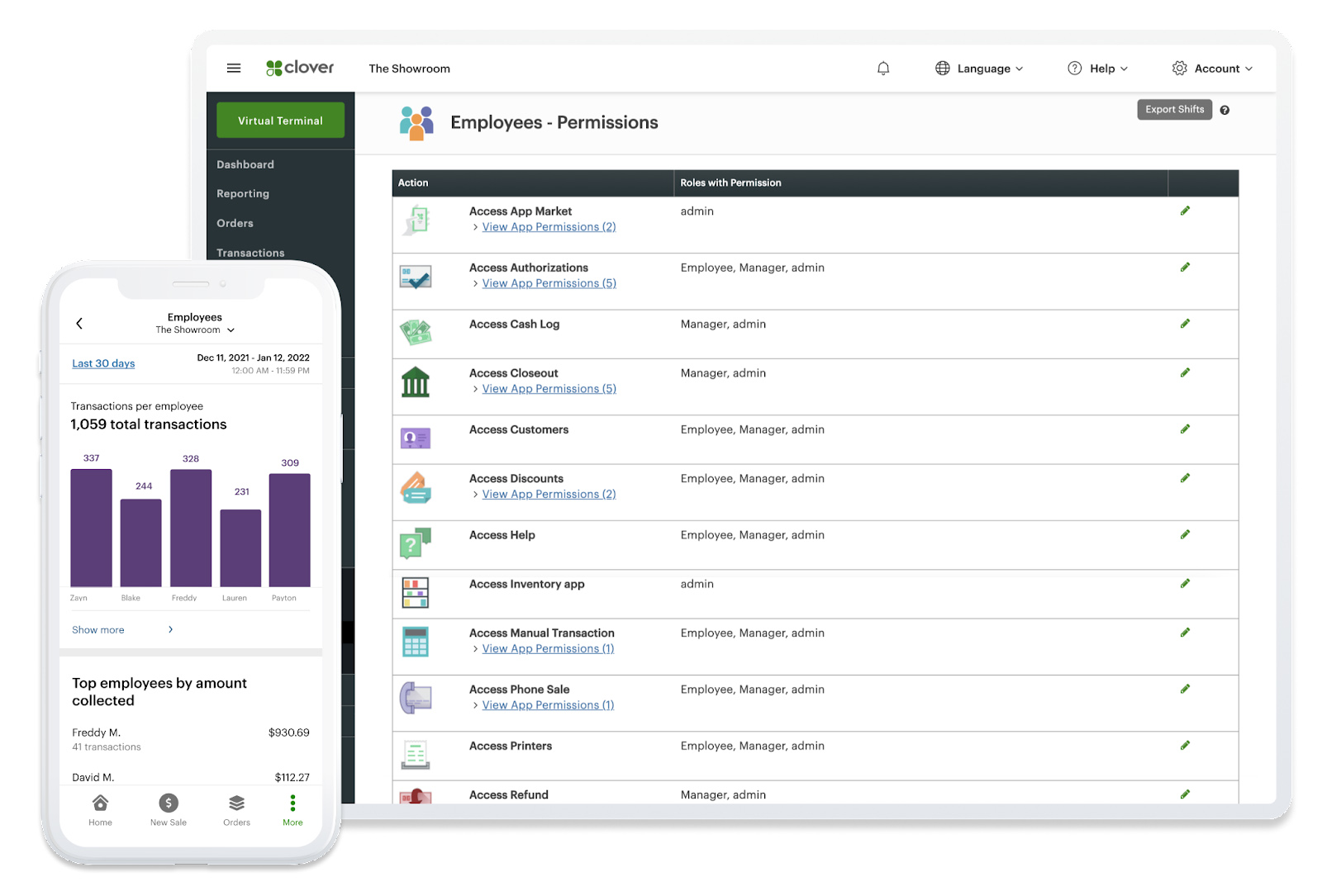
Clover gives you total control of your employees’ login, permissions, and shift schedules. (Source: Clover)
(Source: Clover)
Clover’s cloud-based reporting dashboard can be accessed on any desktop or a mobile device via the Clover Go mobile app. The dashboard features a quick summary of overall business performance including end-of-day reports, total sales per employee and across locations, best-selling products, credit card transactions by card type, and more. Most Clover reports are available only for paid plans. This includes real-time sales tracking, inventory movement, employee performance, and tax reporting tools. You can also build customized reports to match your growth goals.
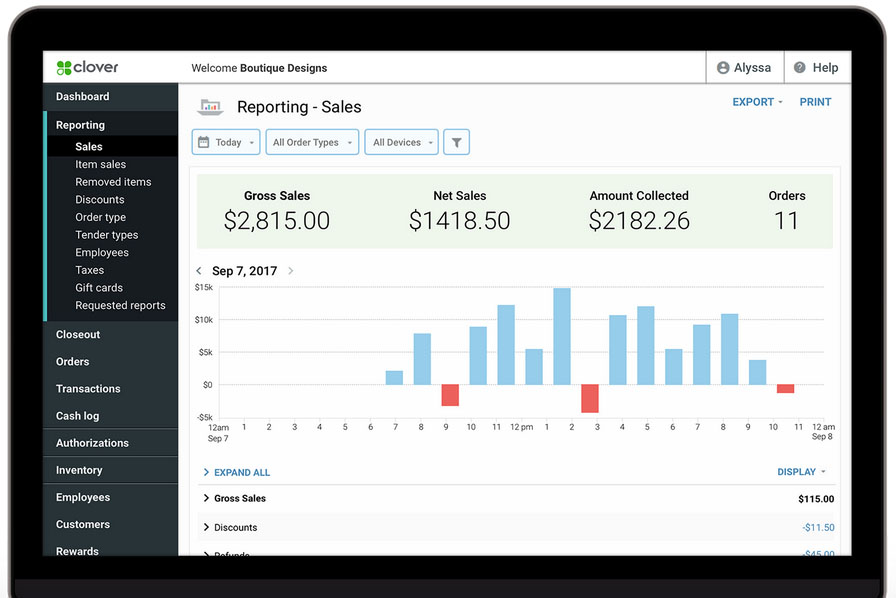
The smart reporting tools—viewable on both desktop and mobile—allow you to analyze inventory movement, identify sales opportunities, and generate sales forecasts to help you reach your goal. (Source: Clover)
One advantage of the Clover system is that it comes with all the tools you need, and as you grow, you can add features from its list of apps. When setting up your business, you can also get 24/7 customer support by phone or email, as well as concierge-level setup if you want this.
The software itself gets above-average points for this category. Its interface is clear-cut; click on what you need to do in the menu bar, then follow the directions. When inputting inventory, you can create it for online ordering and for the console. You can also import inventory from a spreadsheet rather than adding items individually. Finally, Clover has over 200 third-party integrations, greatly increasing its versatility and functionality.
Two things detract from Clover’s ease of use: one, the lack of images in inventory management, which can make it more difficult to find specific items; and two, the lack of built-in vendor management tools, which means you’ll need to search elsewhere (such as third-party integrations) for this function.
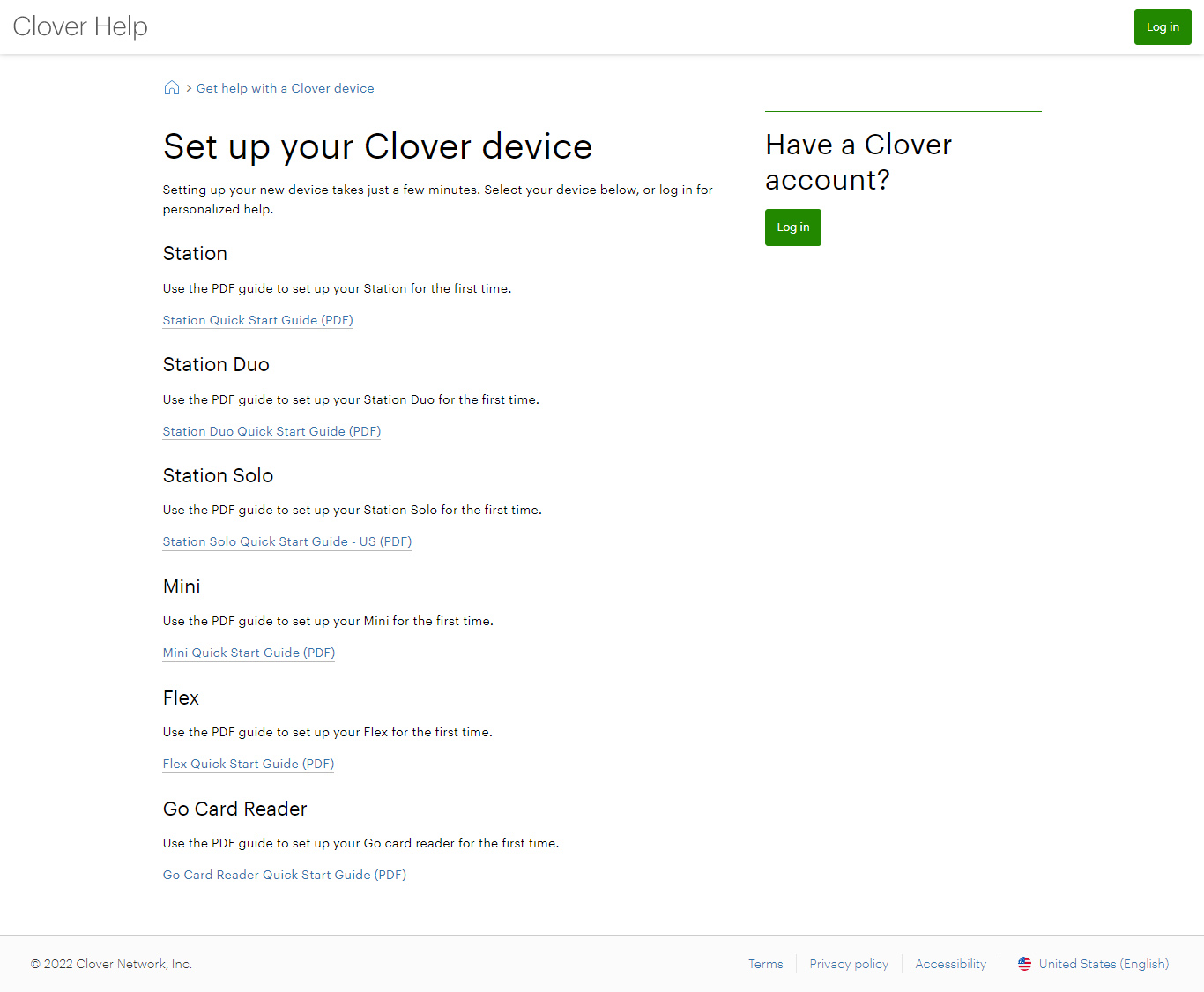
Once you receive your Clover hardware, you can download the setup guide from the Clover website to help you get started. (Source: Clover)
Overall, we find Clover a solid POS with sophisticated features to run a busy retail or restaurant business. Subscription plans advertised on its website are within reason and user feedback of the system is generally positive.
However, given that you need to have the right merchant account to maximize Clover’s potential as a POS system, it may not be the best software for new, small business owners with no preferred merchant services provider to start with.
Additionally, the price structure can be confusing. It has also been mentioned more than once in the user reviews that they had to sign up for a few third-party integrations to access additional tools—something that could easily alarm anyone working on a budget, or who just wants to know that they have access to a full set of POS tools right off the bat.
Methodology: How We Evaluated Clover POS
To evaluate Clover, and all POS systems, we test each system ourselves. We start by looking at affordability along with a core set of features every POS should have, including easy transaction and order management, robust and flexible payment processing tools so you can affordably accept your customers’ preferred payment method, along with core business management features like inventory tracking, sales reports, and team management.
Of course, each system also needs to be easy to use, offer good value, and be able to grow with your business.
We use these criteria to examine the best overall POS systems. However, when looking at specific use cases, such as for retailers, complex inventory management, or mobile POS, we adjust the criteria to match the needs of those business types, which is why every POS has multiple scores across our site depending on the use case you are looking for.
Click through the tabs below for our retail POS evaluation criteria:
30% of Overall Score
We award points for systems with a starter plan with monthly fees less than $75 (with extra points for free plans) and transparent payment processing fees including negotiable or volume discount rates. We also dock points for caps on the number of users, products, transactions, or sales you can process without upgrading plans. Clover earned above-average marks here; the subscriptions are reasonably priced, it allows unlimited users for each plan, and its default payment processing fees (with Fiserv) are clearly laid out.
20% of Overall Score
We look for customizable hotkeys and easy product lookup, return management, mobility to ring sales curbside or on the sales floor, flexible payment tools like contactless, gift card, store credit, layaway, and order-ahead options. Finally, we considered whether the system can process custom, work, or service orders such as repairs. Clover scored better here, only missing out on points for having to upgrade to higher plans for some features.
15% of Overall Score
For retail POS systems, our main focus is on inventory management—low-stock alerts, matrix inventory, and purchase orders, plus easy stock counts and shipment receiving. We also consider vendor management, marketing, employee management features, and reporting capabilities. Clover struggled in this section with almost all of the features lacking advanced functionality or requiring additional fees, integrations, or API.
15% of Overall Score
We look for easy installation, detailed training materials, and 24/7 customer support. We also consider whether the system is a hybrid installation or otherwise offers an offline mode so you can still operate if the internet connection goes down. We also favor software that can run on various hardware so retailers can choose their preferred devices. Finally, we took our own experience using the software into account, examining how features performed in practice. Clover fared well in this category; most of the points missed were for lack of better customer support and flexible hardware options.
20% of Overall Score
In this section, we evaluated Clover by its full feature set (including any standout tools), the value it offers for the price, popularity, user reviews, whether or not the system experiences a lot of downtimes, and the overall experience of navigating the system’s interface. Clover obtained a decent score here, performing well but not excellently in each category.
Frequently Asked Questions (FAQs)
Click through the questions below to get answers to some of your most frequently asked Clover POS questions.
Yes. Clover’s website contains a list of compatible accessories for the POS system, including weight scales, scanners, printers, and login cards. If you need help connecting these accessories to your Clover system, you can contact your business consultant, whose contact number is in your POS web dashboard.
You can do this from your web dashboard, following these steps:
- On a web browser, log into your Clover account.
- On the bottom left navigation, select Account & Set Up.
- Under Business Operations, select Taxes & Fees.
- Select Add Tax Rate or Flat Fee.
- Enter a name for the tax or fee.
- Select an option:
○ For a tax, choose Tax Percentage and enter the tax rate.
○ For a fee, choose Flat Fee and enter the fee amount. - (Optional) Select Default to apply this tax or fee to all items with default taxes and fees turned on. The tax will then be automatically charged at check out.
- Click Save.
While the Clover POS software itself is generally good, some users feel that Fiserv is not great to work with. Additionally, when going with third-party resellers, policies and contracts can vary in quality due to lack of oversight on these resellers. These discrepancies can lead to inconsistent or negative experiences for some users.
Bottom Line
With a customized software and hardware package designed specifically for your business, it’s hard to find something not to like about Clover. For savvy retail and restaurant business owners, it’s worth checking out. However, note that Clover can be purchased from thousands of resellers, and the system cannot be reprogrammed, so it can get tricky if you have not worked with a merchant account before. Our suggestion: find the best merchant service for you, then ask about Clover. Alternatively, you can also go straight to Clover and ask for a demo today.
User review references:
1 Capterra
2 G2
3 App Store
4 Google Play
5 Finances Online